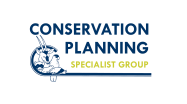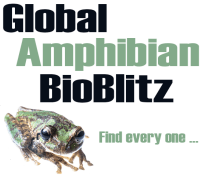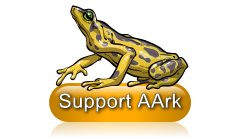 This fellowship supports early or mid-career scientists and conservationists in research-based professional development that furthers amphibian conservation. Applicants must have completed their PhD, and be less than 8 years postdoctoral. This fellowship is not intended to help support graduate-student research. Proposals that address species research priorities indicated in the Amphibian Red List and/or the Amphibian Ark Conservation Needs Assessment (CNA), or thematic research priorities indicated in the Amphibian Conservation Action Plan (ACAP) will be given preference. If applicants are applying for funds to support an internship or externship at another institution, they must be formally associated with a mentor or lead scientist at a relevant university, NGO, zoo/aquarium, or other established institution; the mentor must supply a letter of support with the application. The fellowship carries a $5,000 stipend and is open to applicants from all countries. If applicants are applying for funds to support an internship or externship at another institution, they must be formally associated with a mentor or lead scientist at a relevant university, NGO, zoo/aquarium, or other established institution; the mentor must supply a letter of support with the application. The fellowship carries a $5,000 stipend and is open to applicants from all countries to which funds may legally be distributed from the United States of America.
This fellowship supports early or mid-career scientists and conservationists in research-based professional development that furthers amphibian conservation. Applicants must have completed their PhD, and be less than 8 years postdoctoral. This fellowship is not intended to help support graduate-student research. Proposals that address species research priorities indicated in the Amphibian Red List and/or the Amphibian Ark Conservation Needs Assessment (CNA), or thematic research priorities indicated in the Amphibian Conservation Action Plan (ACAP) will be given preference. If applicants are applying for funds to support an internship or externship at another institution, they must be formally associated with a mentor or lead scientist at a relevant university, NGO, zoo/aquarium, or other established institution; the mentor must supply a letter of support with the application. The fellowship carries a $5,000 stipend and is open to applicants from all countries. If applicants are applying for funds to support an internship or externship at another institution, they must be formally associated with a mentor or lead scientist at a relevant university, NGO, zoo/aquarium, or other established institution; the mentor must supply a letter of support with the application. The fellowship carries a $5,000 stipend and is open to applicants from all countries to which funds may legally be distributed from the United States of America.
Applications will be invited from 1 August each year and must include: current CV, a letter from the mentor with whom the applicant is intending to work, the names and contact information (email addresses) for two additional references who may be contacted by the Amphibian Ark, and a Statement of Purpose. This Statement should be no longer than two pages and should provide specifics of the proposed research as well as the applicant’s academic and professional experiences relevant to the research. Proposals to work directly with live animals must be accompanied by copies of appropriate governmental and institutional animal-care and collecting permits as relevant, and invitations or acceptance letters from hosting institutions or programs. Fellowships are for one year, with potential for an additional one-year renewal depending on need and progress towards research goals.
Funds will be distributed to the successful applicant as a single payment. No financial reporting or receipts for expenses are required by Amphibian Ark. Because this is a fellowship that may be used for any purposes, including travel and living expenses, no detailed budget is required in the application, but please do describe fully how the funds will be used.
A report that describes the results of the research undertaken during the Fellowship period must be submitted to the Amphibian Ark at the conclusion of the Fellowship. The report should indicate how the results of the research will impact future work in the same discipline.
Application materials and the letter of support from the mentor should be e-mailed to: Amphibian Ark, grants@amphibianark.org. Submission deadline: 1 September 2023.
A committee appointed by the Amphibian Ark will review all nominations and then submit their choice for award recipient to the Amphibian Ark Executive Director for endorsement.
View previous Fellowship recipients.
About George and Mary Rabb
This fellowship honors Dr. George B. Rabb and his life-long partner Mary Rabb. From his boyhood days studying herps in Charleston, South Carolina through the remainder of his life, George was passionate about amphibians, conservation, and providing encouragement to developing scientists. A noted scientist, long-time Director of the Chicago Zoological Society, Chair of the Species Survival Commission of the International Union for Conservation of Nature (IUCN SSC), and recipient of numerous awards, George was a thoughtful, quiet, humble person. He never sought the limelight, and never cared about being right, only that the right thing was done. He played essentials roles in stimulating, provoking and initiating new directions in amphibian conservation, ranging from the Declining Amphibian Populations Task Force (DAPTF), the Amphibian Conservation Action Plan (ACAP), the Amphibian Ark (AArk) and the Amphibian Survival Alliance (ASA). George was a steadfast supporter and advisor to the Amphibian Ark from its inception, and this fellowship recognizes that which George held dear.













